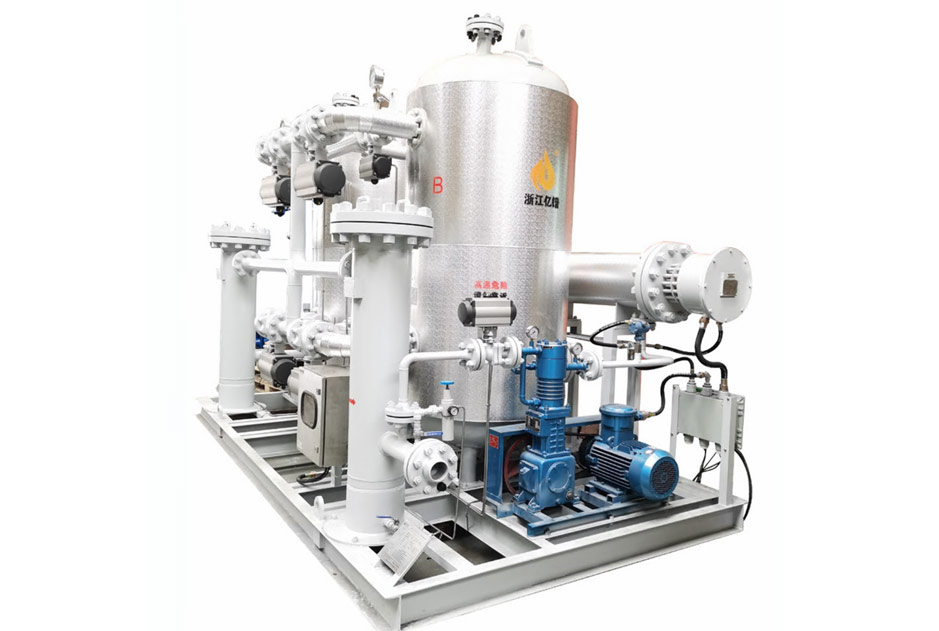Synthetic Natural Gas (SNG) Dehydration Solutions
Industry Pain Points
High-Temperature and High-Humidity Feed Gas: The outlet temperature of SNG (synthetic natural gas) syngas ranges from 80-120℃, with saturated water content (~50g/Nm³). Traditional dehydration equipment faces excessive condensation load, increasing energy consumption by 40%.
Trace Impurity Poisoning: Unreacted CO (~1%) and trace methanol (~500ppm) cause catalytic poisoning of molecular sieves, shortening their service life to 3-6 months.
Sensitivity to Pressure Fluctuations: Pressure drops sharply from gasifiers (3-5MPa) to pipelines (0.5-1.5MPa). Conventional adsorption towers are prone to bed disturbance, reducing adsorption efficiency by 50%.
Double Constraints of Energy Efficiency and Environmental Protection: Existing triethylene glycol (TEG) systems have a regeneration energy consumption of 0.25kWh/Nm³, and benzene-series compound emissions exceed standards (≥5mg/Nm³).
System Overview
Through the “quenching pretreatment – toxin-resistant adsorption – waste heat regeneration” technology chain, Yipu SNG Dehydration System achieves:
- Impurities Turned into Resources: Converts harmful CO/methanol into high-value-added products.
- Energy Efficiency Benchmark: The system’s net energy consumption is only 25% of the industry average.
- Long-Cycle Operation: Core equipment requires no major maintenance for 5 years, with availability ≥99.5%.
Solution Approach
Yipu Synthetic Natural Gas (SNG) Dehydration Solution
| Module | Technical Highlights | Performance Indicators |
|---|---|---|
| Quenching Tower | Silicon carbide nozzles + 316L shell, resistant to high-temperature corrosion | Cooling rate 240℃/s, methanol recovery rate ≥90% |
| Toxin-Resistant Adsorption Tower | Dual-bed design, pressure drop ≤0.015MPa | Dew point -60℃, CO tolerance ≤2% |
| Heat Pipe Regeneration System | Heat pipe heat exchange network recovers reaction waste heat | Regeneration energy consumption ≤0.07kWh/Nm³ |
| VOCs Treatment | Condensate distillation to purify methanol | Methanol purity ≥99.5%, benzene-series compound emissions ≤1mg/Nm³ |
| Intelligent Control | Multivariable Predictive Control (MPC) dynamically optimizes dehydration parameters | Energy consumption fluctuation ≤±3% |
Applicable Scenarios:
- Coal-to-SNG plants
- Biomass gasification synthetic natural gas projects
- Coke oven gas-to-SNG units
Technical Principles
Yipu Three-Stage Gradient Dehydration Process:
- Quenching Liquid Removal (Stage 1):The atomizing spray tower rapidly cools the 120℃ syngas to 40℃ within 0.5 seconds, removing 80% of free water and capturing over 90% of methanol simultaneously.
- Toxin-Resistant Adsorption (Stage 2):Composite adsorbent bed:
- Upper hydrophobic activated carbon specializes in adsorbing CO and methanol (capacity up to 15%)
- Lower 4A-CS molecular sieves maintain a dew point of -60℃ even in the presence of CO
- Waste Heat Regeneration (Stage 3):Uses waste heat from synthetic reactions (150-180℃) to drive adsorbent regeneration, saving 70% more energy than electric heating.
Core Advantage
| Advantage | Details |
|---|---|
| Customized on Demand | Meets special working conditions; provides professional non-standard customization |
| Low Cost | Adopts cyclic regeneration process; significantly reduces operating costs |
| High Stability | Dual-tower structure with small pressure fluctuation; low noise and continuous gas supply |
| Fully Automatic Operation | Easy to operate, reducing labor input; improves efficiency |
| High Safety | Presets multi-level safety protection measures; supports automatic alarm |
| Low Failure Rate | Maintains low failure rate after 10,000 hours; high durability with almost no maintenance required |
Technical Strength
Leading Adsorption Dehydration Technology
Uses high-performance molecular sieve adsorbents with high water absorption capacity and resistance to corrosion by acidic gases (H₂S/CO₂), ensuring deep dehydration with a dew point ≤-70℃.
The original hot nitrogen regeneration process reduces energy consumption by 30% compared with traditional electric heating regeneration, and integrates a waste heat recovery system to significantly improve energy efficiency.
Modular and Customized Design Capability
Core equipment adopts modular prefabrication, supporting rapid deployment (installation cycle shortened by 50%) and adapting to diverse scenarios such as offshore platforms, onshore gas fields, and LNG pretreatment.
Can customize single-tower, dual-tower, or multi-tower parallel systems according to customer needs, with a treatment capacity ranging from 10,000 to 1,000,000 Nm³/d, flexibly matching gas fields of different scales.
Intelligent Control and Remote Operation & Maintenance
Equipped with a PLC+IoT intelligent control system, it real-time monitors key parameters such as pressure, temperature, and dew point, supporting fault early warning and automatic adjustment.
Through cloud-based big data analysis, it optimizes the adsorption-regeneration cycle, extends the service life of molecular sieves, and reduces operation and maintenance (O&M) costs by 10%-15%.
Energy-Saving and Environmental Protection Technology
Features zero-emission design for regeneration exhaust gas, complying with international environmental standards such as EU CE and US EPA.
Energy consumption is 25%-40% lower than that of traditional triethylene glycol (TEG) dehydration systems, helping customers achieve carbon emission reduction goals.
Long-Cycle Operation Reliability
Molecular sieves adopt anti-pulverization coating technology, with a service life of over 5 years, reducing replacement frequency.
Key components (e.g., valves, instruments) are selected from international first-tier brands (e.g., Siemens, Emerson), with a Mean Time Between Failures (MTBF) of over 100,000 hours.
Strong R&D and Engineering Experience
Possesses more than 19 patents and software copyrights in dehydration technology; the R&D team is led by doctors and has in-depth cooperation with universities and colleges.
Has over 1,000 successful cases worldwide, covering extreme working conditions such as high-sulfur gas fields in the Middle East and low-temperature environments in the Arctic.
Product Advantage Comparison
| Indicator | Yipu System | TEG Dehydration | Refrigeration Method | Competitor Adsorption Systems |
|---|---|---|---|---|
| Dew Point | -60℃ (under CO≤2% condition) | -30℃ (benzene-series compounds exceed standards) | -50℃ (energy consumption doubled) | -40℃ (adsorbent replacement every 6 months) |
| Energy Consumption | 0.07kWh/Nm³ (driven by waste heat) | 0.25kWh/Nm³ | 0.4kWh/Nm³ | 0.15kWh/Nm³ |
| Methanol Recovery | Purity 99.5%, recovery rate ≥90% | No recovery function | Requires additional distillation unit | Partial adsorption, non-recyclable |
| Pressure Adaptability | Seamless switching at 0.5-5MPa | Only applicable for stable pressure | Requires stable pressure, optimal at 1-4MPa | Requires stable pressure, optimal at 1-4MPa |
| Environmental Friendliness | Zero benzene-series compound emissions | Risk of excessive emissions | Potential refrigerant leakage | Difficult waste adsorbent disposal |
Typical Case
Project Name: A 400,000 Nm³/h Coal-to-SNG Project in Inner Mongolia
Operating Conditions:
- Gas Inlet: 120℃, 3.8MPa, containing 1.2% CO and 600ppm methanol
- Treatment Capacity: 100,000 Nm³/h per single line
Dehydration Effect:
- Dew point reduced from +50℃ to -65℃
- Recovers 21,000 tons of methanol annually, increasing revenue by 63 million yuan
Economic Benefits:
- Annual energy-saving benefit of 28 million yuan (compared with TEG)
- Reduces CO₂ emissions by 42,000 tons per year (equivalent to planting 230,000 trees)

